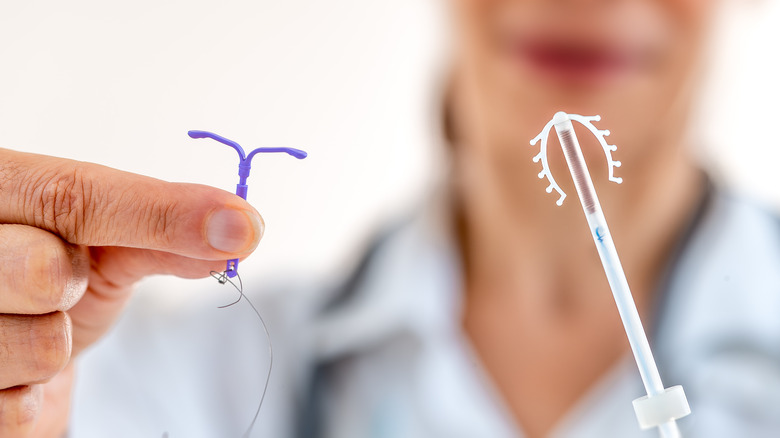What Happens If You Get Pregnant With An IUD?
An intrauterine device (IUD) is a small T-shaped form of birth control made of plastic placed into a uterus to prevent pregnancy, explains MedlinePlus. Pregnancy occurs when sperm make contact with an egg during ovulation. However, when an IUD is used, the sperm is prevented from reaching the egg, either by hormones or copper, depending on the type of IUD implanted (per Planned Parenthood).
IUDs are one of the most effective forms of birth control. When properly placed, the chance of getting pregnant with a hormonal IUD is between 0.1 and 0.4%, while a copper IUD is 0.8%, according to the Centers for Disease Control and Prevention. For comparison, the chances of a male condom failing are 13%, and birth control pills fail 7% of the time.
However, despite the very low chance of pregnancy with an IUD, the only way to be 100% certain that you won't get pregnant is not to have sex. Pregnancy can still occur with an IUD; if that happens, you may wonder what to do about it.
What to do if you believe you're pregnant
The chances of becoming pregnant with an IUD are very low. WebMD states that less than 1% of women who have an IUD get pregnant every year. While unlikely, it's certainly possible. If you have an IUD and think you are pregnant, make an appointment with your doctor immediately, explains MedicalNewsToday. They will determine the best course of action depending if you have an intrauterine pregnancy, a normal pregnancy where the baby grows inside the uterus, or an ectopic pregnancy where the baby is growing outside the uterus.
If the pregnancy is not ectopic, how the doctor proceeds will depend upon the position of the IUD, the gestational age of the fetus, and the wishes of the pregnant person. Depending on these variables, the person may either terminate or continue with the pregnancy. At that point, their doctor will most likely remove the IUD, according to Verywell Health. However, even if the IUD is removed at a relatively early stage, complications with the pregnancy can still occur, such as preterm delivery, bacterial infection, low birth weight, and loss of the pregnancy, according to a 2018 study.
If the pregnancy is ectopic, it must be removed (per Verywell Health). If it isn't, it can cause tears and bleeding or even be fatal.
How to prevent pregnancy when using an IUD
Maintaining the device properly is the best way to avoid pregnancy with an IUD. There are many reasons why an IUD can fail, but most of them can be avoided with precautions.
First, don't have sex for a week after getting a hormonal IUD. Copper IUDs work immediately, but hormonal versions take seven days to begin preventing pregnancy (per WebMD). You can use a backup form of birth control to prevent pregnancy during this week, but abstaining from sex until the IUD begins to work is the safest option.
Second, keep track of your IUD's expiration date. Depending on the type and brand, a hormonal IUD should be replaced every 3 to 5 years, while a copper IUD can stay in for 10 years, explains GoodRx Health. The IUD won't suddenly stop working after the expiration date, but the chances of getting pregnant increase.
Third, check for your IUD after sex. If an IUD is correctly placed inside the uterus, the chances of it falling out or repositioning are small (via WebMD). However, it can happen. After sex, feel for the strings connected to the IUD to confirm that it is still inside you and in the correct position.
Finally, combining it with another form of birth control is a good idea. It may not be appropriate for all. However, a 2010 study suggests that if all IUD users also use condoms, this could reduce unplanned pregnancies and abortions by about 80%.



